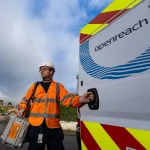Home » UK ISP News Archive » Daily Archives: May 21, 2013 (7 Posts Found)
Sponsored Links
You are viewing a May 21, 2013 news and article archive where older items are stored for readers to access and view. This is done to keep the systems running smoothly and prevents the front page from becoming too cluttered.
Search ISP News
Search ISP Listings
Search ISP Reviews
ISP News Archives for May 21, 2013
21st May 2013 (0 Comments)
Budget ISP Direct Save Telecom has today announced the expansion of their business by opening up two new regional sales offices in Slough and Croydon (Southern England), which will help to create 60 new full-time jobs in the region.
21st May 2013 (0 Comments)
The Nottinghamshire County Council (NCC) has managed to secure an addition £2.7 million in funding from the European Regional Development Fund (ERDF), which will help its efforts to make superfast broadband available to over 90% of local people by around 2016.
21st May 2013 (6 Comments)
A new survey of 100 senior IT strategists at UK organisations of all sizes, which was published by Zen Internet today, has revealed that 22% of businesses have adopted FTTC superfast broadband for their office WAN connectivity; the same proportion as those with dial-up. But Leased Lines remain dominant.
Advertisement
21st May 2013 (0 Comments)
Business ISP Metronet UK has expanded the coverage of its hybrid superfast fibre optic (Dark Fibre) and carrier grade wireless network to reach areas of Widnes, Runcorn and Speke in Liverpool (Merseyside, England).
21st May 2013 (6 Comments)
The European Commission’s Digital Agenda boss, Neelie Kroes, will next month unveil her plans for a single telecoms market that is expected to propose the semi-abolishment of national regulators and the creation of one regulator to govern the whole of Europe (telecoms policy).
21st May 2013 (2 Comments)
Advertisement
21st May 2013 (6 Comments)
A new report from Point Topic has claimed that the cost of making superfast broadband (30Mbps+) available to 100% of the UK and Europe could be just £69 billion (EUR 82bn), which is considerably less than the original estimate of up to £228 bn (EUR 270bn). The catch is it would be hybrid-fibre (FTTC/N) and not true fibre optic (FTTH/P).
Cheapest Big ISPs for 100Mbps+
Community Fibre £19.00
100Mbps (100Mbps up)
Vodafone £22.00
150Mbps (27 - 150Mbps up)
Virgin Media £23.99
264Mbps (25Mbps up)
Plusnet £24.99
145Mbps (30Mbps up)
Latest UK ISP News
Promotion
The Top 15 Category Tags
- FTTP (6858)
- BT (3902)
- Politics (3099)
- Business (2795)
- Openreach (2682)
- Building Digital UK (2526)
- Mobile Broadband (2502)
- Statistics (2148)
- FTTC (2148)
- 4G (2116)
- Virgin Media (2042)
- Ofcom Regulation (1790)
- 5G (1759)
- Fibre Optic (1610)
- Wireless Internet (1607)
New Forum Topics
By: AbsolutelyRidiculous
By: The Wee Bear
By: meritez
By: Lucian
By: ewanmclean2005
Promotion
Helpful ISP Guides and Tips
Latest Interviews
Sponsored
Copyright © 1999 to Present - ISPreview.co.uk - All Rights Reserved - Terms , Privacy and Cookie Policy , Links , Website Rules , Contact




































